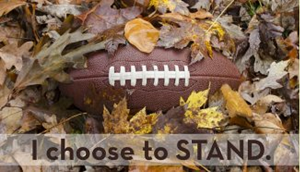National Football League (NFL)…Goodbye
 20 October 2017
20 October 2017
As I was driving home from church on Sunday, 24 September, a report of NFL players kneeling during the national anthem rumbled from my truck radio. The Baltimore Ravens and Jacksonville Jaguars were playing in London. The number of players participating in this protest had dramatically increased from previous games. The explanation was that the kneeling players were responding to comments made by President Trump in which he said players who do not stand during the anthem should be fired. My response was one of outrage, disgust, confusion, and a multitude of other similar reactions. When I got home, I shared the account with my wife, who is a committed NFL fan. My final statement to her was, “I won’t be watching any NFL games.” That is my position while this protest continues; however, it might be that I never watch another NFL game, even when the protest ends.
As I have researched and thought through this “refusal to stand” protest, my opposition to it has simply grown more concrete. Colin Kaepernick, former San Francisco 49ers quarterback, was the first athlete who refused to stand during the national anthem. This was during the 2016-17 season. His was a protest to police treatment of minorities. The current refusal to stand during the National Anthem is said to be a protest to the oppression of Black Americans.
My research and thinking through started with the claim of oppression. Cambridge English Dictionary defines “oppression” as “…a situation in which people are governed in an unfair and cruel way and prevented from having opportunities and freedom.” As I look at all that is available to blacks in this country, I cannot come anywhere close to seeing “oppression.” Americans are, by no means, perfect in how we treat one another, but to label treatment of blacks in America as “oppression” defies reason. There are examples in the lives of millions of us (Black Americans) that defy this claim of oppression. Put the millions of examples aside and simply consider the average annual salaries of some of the black NFL players who are participating in this protest. Here are four players from a list of nine in an article by Brent Scher titled, “Here Are the Highest Paid NFL Players Who Protested the National Anthem on Sunday”: Denver Broncos’ Von Miller $19 million; Buffalo Bills’ LeSean McCoy $8m; New England Patriots’ Devin McCourty $9.5m; Los Angeles Chargers’ Melvin Ingram $16m.
These are black men who are paid millions per year to play a game that is substantially supported by whites in America. These players certainly do not appear oppressed. This is a nation that affords black citizens free public education through high school; programs that enhance the likelihood of college admission; protections from discrimination in employment;equal access to various government entitlement programs; access to military service; protections for equal access to housing. The list goes on. Again, I say, America has racial challenges, but defining the condition as oppression is inaccurate, unfair, and hinders successfully addressing issues of race in this country.
I cannot understand how anybody thinks that not standing during the national anthem will rally Americans to seriously seek to resolve issues of race. The Free Dictionary includes two statements that explain my inability to understand this mode of protest: “A national anthem is a song formally adopted as the anthem for a nation. An anthem is a song of devotion or loyalty (as to a nation or school).” Given this explanation, Americans who refuse to participate in the prescribed manner during the National Anthem open themselves to charges of being disrespectful of, and unpatriotic to, our nation.
No matter what is intended, given the role of the national anthem, refusing to stand is viewed by many Americans as totally unacceptable. In great part, objection to people not standing is driven by appreciation for the human cost paid, and being paid, to insure our freedom. Those few minutes when the anthem is shared calls us to reflection. That is, remembering those who serve and have served in the military of this nation…those who gave their very life in defense of America. Beyond that, there is reflection on all that is good about our country. This is a solemn time that holds tremendous meaning for those who love and appreciate America. Consequently, protesting during the anthem is doomed to failure.
When challenged regarding their protest, participating players and others rush to Amendment 1 of the U.S. Constitution. They argue that players, even at work, have free speech rights under that amendment. The amendment says: “Congress shall make no law respecting an establishment of religion, or prohibiting the free exercise thereof; or abridging the freedom of speech, or of the press; or the right of the people peaceably to assemble, and to petition the government for a redress of grievances.” The focus here is on government not being allowed to compress freedom of speech.
The amendment does not apply to actions by employers. The truth of this statement shows through in NFL rules that affect players’ freedom of expression. The examples abound: even though recently relaxed, very detailed rules on end zone celebrations; what players may and may not wear during a game; the Dallas Cowboys were not allowed to, during preseason or regular season games, wear a decal showing support for Dallas police and family members of five officers killed by a sniper on 7 July, 2016. Add to this list the following from an article by Hank Berrien titled, “NFL’s Free Speech: Kneeling For the Anthem Is Fine, But Fighting Breast Cancer And Domestic Violence? Shut Up”:
In 2013, Chicago Bears wide receiver Brandon Marshall was fined $5,250 for wearing green shoes in honor of Mental Health Awareness week, which was especially poignant because Marshall himself suffered from Borderline Personality Disorder, as FOX Sports noted.
Pittsburgh Steelers running back DeAngelo Williams was fined $5,787 in 2015 for wearing “Find the Cure” eye black with the message “We will find a cure” printed along with a pink ribbon, according to Aditi Kinkhabwala of NFL Network. His mother died of breast cancer in 2010.
The preceding discussion shows the NFL, or individual team owners, is not bound by First Amendment provisions. Consequently, allowing the anthem protest is not required. That leads me to wonder why the league and owners are allowing these protests to continue. I think former Milwaukee County Sheriff David Clarke partially answers the question as reported in an article by Todd Beamon titled, “David Clarke: NFL Protests Part of Left’s ‘Culture War’”. Here are two Clarke quotes from that article:
“‘Really what it’s designed to do . . . is to shake the foundations of this country, this great country.’”
“’To create as much chaos as they can,’” he added. “’To pit brother against brother, family against family — and ultimately bring down the Constitution of the United States and this great republic.’”
David Clarke is correct. Across this nation, groups and interests are being pitted against one another for political gain and dangerous societal change. In the process, the Constitution of this great nation is being shredded and chaos is engulfing us. This anthem protest clearly advances this strategy of division, chaos, and eventual control of the minds of people.
At the bottom line, we have a protest that is based on a false narrative (oppression): disrespecting a solemn practice intended to express love for our nation and appreciation for those who preserve our freedom; wrongly seen as protected by the 1st Amendment; and helping advance the destructive strategy of division, chaos, and mind control.
The sad truth is, in the end, the vast majority of Americans lose…especially Black Americans. In this anthem protest, we are being further divided and absolutely nothing is being accomplished by way of positively addressing issues of race in this country.




